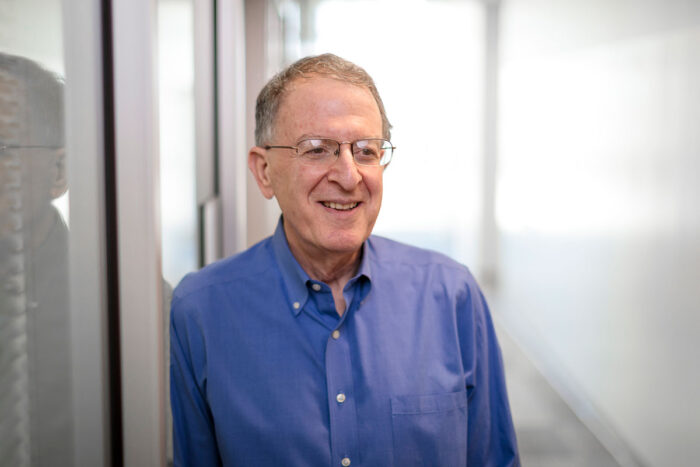Gordon honored by National Academy of Medicine
Gut microbiome pioneer to be recognized with newly established award
 Matt Miller
Matt MillerJeffrey Gordon, MD, of Washington University School of Medicine in St. Louis, has received the inaugural David and Beatrix Hamburg Award for Advances in Biomedical Research and Clinical Medicine from the National Academy of Medicine (NAM). Gordon, regarded as the father of the field of microbiome research, is known for his work revealing the fundamental role of gut microbes in human health and disease.
Jeffrey I. Gordon, MD, the Dr. Robert J. Glaser Distinguished University Professor and director of the Edison Family Center for Genome Sciences & Systems Biology at Washington University School of Medicine in St. Louis, will be the inaugural recipient of the David and Beatrix Hamburg Award for Advances in Biomedical Research and Clinical Medicine, a newly established honor from the National Academy of Medicine (NAM).
The academy created the award to recognize creative and accomplished biomedical scientists who are advancing health and the human condition around the world. It honors an exceptional biomedical research discovery, translation, or public health intervention that has fundamentally enriched the understanding of biology and disease, leading to a significant improvement in human health and social well-being and a reduction in global health inequities.
Named for David Hamburg, who was president of the Institute of Medicine from 1975-80, and Beatrix Hamburg, a NAM member and expert in child and adolescent behavioral health, this new award will be presented yearly.
Washington University School of Medicine and its faculty have a storied history with the National Academy of Medicine. Established in 1970, when it was known as the Institute of Medicine, the academy’s 28 founding members included three Washington University researchers who were national leaders in academic medicine: W. Barry Wood Jr., MD, Carl V. Moore, MD, and Robert J. Glaser, MD.
Wood became head of Washington University’s Department of Internal Medicine in 1942, established the school’s Division of Infectious Diseases and was known for his studies of pathogenic bacteria and the body’s response to such infections. Moore led the Department of Medicine from 1955-72 and was known for his studies of iron metabolism and blood clotting. Glaser joined the School of Medicine faculty in 1945, focusing on streptococcal infections and rheumatic fever, and served as assistant and associate dean until 1957, after which he became dean of the medical schools at the University of Colorado and Stanford University.
As director of medical science at the Lucille P. Markey Charitable Trust, Glaser oversaw distribution of more than $500 million to support biomedical research, and through the Markey Trust Scholars Program, the work of extraordinarily talented postdoctoral scholars at institutions throughout the country. In 2002, Gordon become the inaugural holder of the Dr. Robert J. Glaser Distinguished University Professorship at Washington University. Gordon, who has spent his entire career at Washington University, has served as mentor to more than 140 doctoral students and postdoctoral fellows since he established his lab — a number of whom have become key leaders in the area of human microbiome research. They have carried forward his commitment to innovative interdisciplinary science and to applying knowledge of the microbiome to vulnerable populations.
Gordon, regarded as the father of the field of microbiome research, is known for his work revealing the fundamental role of gut microbes in human health and disease. Gordon’s research has been instrumental in expanding the understanding of gut microbes from a narrow focus on individual disease-causing species to a broader understanding of how whole communities of gut microbes play central roles in health and disease. His team is particularly focused on understanding the causal roles gut microbial communities play in defining nutritional status.
Childhood malnutrition is a major global health challenge, affecting over 150 million children under the age of 5 worldwide, with a disproportionate impact in South Asia and sub-Saharan Africa, according to the World Health Organization. Many studies have shown that malnutrition is not due to food insecurity alone but instead reflects a combination of factors. These factors include a key role for the gut microbiome, which Gordon’s work has shown fails to develop properly during the first two years of life in malnourished children.
Working with long-standing collaborator Tahmeed Ahmed, PhD, of the International Centre for Diarrhoeal Disease Research in Dhaka, Bangladesh, Gordon and his lab members have translated findings from their fundamental mechanistic studies of gut microbial community development and function, gleaned from their innovative animal models, to randomized controlled clinical trials involving malnourished infants as well as children. For example, they have shown that a novel food formulation designed to increase the representation and expressed beneficial functions of specific bacterial strains in the gut communities of malnourished children restores their growth and increases the levels of key blood proteins that mediate various facets of musculoskeletal development, immune function, metabolism and facets of neural development.
“It is a great honor to be recognized by the National Academy of Medicine with this inaugural award focused on promoting social well-being and reducing global health inequities,” Gordon said. “The award is a testament to the inspiring trainees and collaborators I have had the privilege and pleasure of working with throughout my career. We are hopeful our research can help develop solutions to challenging global health problems and have the potential to improve quality of life for many people around the world.”







